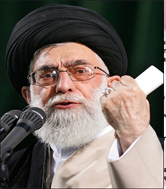“We will never stop supporting our friends in the region and the people of Palestine, Yemen, Syria, Iraq, Bahrain and Lebanon. Even after this deal our policy towards the arrogant U.S. will not change,” Ayotollah Khamaeini commenting on signing the Nuclear Deal.
In the 21st century, economic power is military power. This new Iran would not need military force to control the Straits of Hormuz. The southern provinces of Iraq, the oil-rich territories across the Straits of Hormuz, will of course be allied to the new Iran. Lebanon, Palestine, Jordan, may all be commercially dependent on the new Iran. The result would be encirclement of Israel by a power far more threatening than ISIS.
So this is the next step. For the next 10 to 15 years Iran will be freed of trade sanctions as long as the Shiite country abstains from building nukes. If the Iranian leaders are smart that is what they’ll do. After all, North Korea has proven to the world that an offensive nuclear capacity is also a road to economic ruin.
This will leave Iran with two choices. One is to use of military means, including the sponsorship of insurgencies, to fight a long-term war with the Sunni states. Aside from their alliances with the United States, this would mean taking on such regional powers as Turkey, the Gulf states, and Saudi Arabia. Under the Obama doctrine, the states have been encouraged to assume their own military responsibilities. An alliance between Turkey and Egypt, backed by American arms and by Saudi petrodollars would be more than a match for Iran.
The second choice makes more sense. Iran should look to the east, to China as a role model. Since Deng Xiaoping, China has fought its battles using commercial power. The other model for Iran lies to its north, Russia. Under Putin, the former world power has spent its wealth undermining its neighbors and competing with tanks rather than commercial airplanes. The results are obvious. China is well on its way to being the equal of the United States. Russia is at best a regional annoyance.
As Pres. Obama has pointed out, the potential of Iran as a regional economic power is immense. Its population is amongst the best educated in the world. Its political system, whatever Americans may think of it, offers far more democracy than the governments of any of its regional rivals other than Turkey. Stripped of its unique relationship to the Koran, Iran’s government works very much like the single party corporatist rule of China or Singapore.
Iran has resources that greatly exceed those of any other developing state. It has energy, a central location ideal for trade, and a highly educated population. Despite the embargo, or perhaps because of it, Iran already has one of the strongest manufacturing bases for automobiles in the world.
So think further. Imagine 10 years from now, the issue of nukes has been put aside. Iran like every other regional power… Brazil, Japan, South Korea, Mexico, Germany, … will have the ability to become a “nuclear power” on short notice. But, this Iran will be emerging as a world economic power. Moreover, unlike the Arab petro powers, this Iran will base its strength not on the price of a barrel of oil but on a world-class manufacturing base. Countries like India, Kenya, Russia, Australia, China, and perhaps the United States itself will be dependent on trade with the Shia state.
